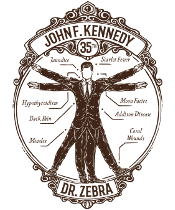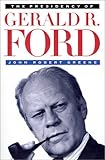

Health and Medical History of President
Gerald FordLived 1913-2006
Health and Medical History of President
Gerald FordLived 1913-2006
1776-1783
1812-1815
1846-1848
1861-1865
1898-1899
1917-1918
1941-1945
1950-1953
1964-1975
1990-1991
2001-2021

Nevertheless, here is the litany:
- While relaxing at an informal gathering, put his feet up on a table, and planted one foot in the middle of a two-pound wheel of Brie cheese (ca. Dec. 1974) 3j.
- Fell while walking down air stairs at a Spanish airport on May 3, 1975 2d.
- Dr. Zebra can remember at least one other slip -- Hit a spectator with a golf ball.
- As Vice President, unexpected turbulence plunged his plane downwards, spilling a gin and tonic on his head 3k. Comment: Yes, it's not really clumsiness, but it had to go somewhere. :-)
Ford would awaken at 5:30 am as President 3b. Comment: Perhaps lack of sleep has something to do with the appearance of aging.
However, one part of his routine did not last. In 2000, he said: "I haven't had a drink in 22 years, she [Betty] hasn't had one in 23 years ... she stopped drinking in 1978. I kept drinking for a year; then I got tired of drinking alone, so we drink [chuckle] tonic and lime at night" 3f.
Upon awakening on Wednesday morning, Ford had new symptoms and returned to the hospital. He apparently had left arm weakness, balance difficulties, and slurred speech 6. A stroke was diagnosed and he was treated with "blood thinners" 6.
The slurred speech, however, was ascribed to a swollen, painful tongue, which proved to be abscessed with actinomycosis. (This is an exceedingly rare cause of a tongue abscess.) The abscess was drained under general anesthesia 7. (It is not clear when the anticoagulants were started, in relation to the abscess drainage.)
Later, a Ford spokesman declared that Ford had developed tongue pain while in Colorado, before Ford departing for the convention 7.
By August 5 Ford was "completely recovered from the stroke" (there were also questions about a possible other strokes) 7. He left the hospital on August 9, still taking antibiotics and blood thinners 8.
The Hahnemann University Hospital was obviously embarassed by missing the diagnosis on the
first night, but refused to admit anything. A hospital spokesman said "We do not believe
there was any misdiagnosis there." He then shamelessly shifted the blame to the patient,
saying "The activities that evening were totally controlled by the President"
6.
Comment:
The question is: how could the abscess have been missed on physical examination the first night,
especially when Ford had noted tongue pain days earlier? How did the physician(s) arrive at
the mistaken diagnosis of a sinus problem? A CT scan is usually not required to discover a
tongue abscess.
Comment: It is possible that missing the tongue abscess the first night played a role in causing the stroke, as there is a tight relationship between inflammation and acute vascular events. In simple terms, inflammation (the classic response to an infection) makes the blood more likely to clot (the actual event triggering a stroke). Older physicians, for example, will recall the classic association between pneumonia and acute myocardial infarction. In Ford's case, the missed diagnosis allowed the infection, hence the inflammation, to progress for the extra few hours leading to the stroke.
- In college, Ford worked in the University of Michigan Hospital, "where I waited on tables at the interns' dining room and cleaned up the nurses' cafeteria after lunch, for which I was paid fifty cents an hour, and I earned enough every day to buy my meals" 3t.
- Ford was ambidextrous. "For as long as I can remember, I have been left handed sitting down and right handed standing up, and as strange as it may sound, I throw a football with my right hand and write with my left" 2e.
- Ford was six feet tall and about 195 pounds, but the time frame for this is not given 2c.
- Blue eyes 3u.
- While serving aboard the light aircraft carrier USS Monterey in World War II, Ford was almost blown overboard in a typhoon 2c. This terrible storm sank a number of ships, and almost sank the Monterey. Wearing a gas mask, Ford led a rescue party into the carrier's hangar area, where airplanes, broken from their moorings and on fire, slid across the deck as the ship lurched 15.
- Bumgarner 2d finds no record of Ford being ill from the time he entered the House of Representatives to the end of his Presidency. He survived assassination attempts on Sept. 5 and 22, 1975 2f.
- On CNN's "Larry King Show," (telecast 3 Jan 04), Ford's wife says the former President
continues to swim in the morning and evening, and to play golf. (The show may have been taped
a few days earlier, as there are references to Chirstmas in the future tense.)
Ford's swimming habit started before he was President 3i.
- Betty Ford's breast cancer and alcoholism were both wake-up calls to the American public. (Happy Rockefeller, the wife of Ford's Vice-President, had breast cancer as well.)
- Walsh, Kenneth T. Air Force One: A History of Presidents and Their Planes. New York: Hyperion, 2003.
- Bumgarner, John R. The Health of the Presidents: The 41 United States Presidents Through 1993 from a Physician's Point of View. Jefferson, NC: MacFarland & Company, 1994.
 a p.272 b pp.272-273 c p.273 d p.274 e pp.272-273 citing A Time to Heal, page 45 f pp.275-276
a p.272 b pp.272-273 c p.273 d p.274 e pp.272-273 citing A Time to Heal, page 45 f pp.275-276Comment: Devotes one chapter to each President, through Clinton. Written for the layperson, well-referenced, with areas of speculation clearly identified, Dr. Zebra depends heavily on this book. Dr. Bumgarner survived the Bataan Death March and has written an unforgettable book casting a physician's eye on that experience.
- DeFrank, Thomas M. Write It When I'm Gone: Remarkable Off-the-Record Conversations with Gerald R. Ford. New York: G.P. Putnam's Sons, 2007.
- Boller, Paul F. Jr. Presidential Anecdotes. New York: Oxford University Press, 1981.
 a p.334
a p.334 - Kolata, Gina. Flu: The Story of the Great Influenza Pandemic. NY: Touchstone, 2001.
- Neal, Pat (plus Associated Press). Ford's condition improves, but swollen tongue stumps doctors. cnn.com. 3 August 2000, 8:19 pm EDT.
- Neal, Pat (plus Associated Press). Ford doing well after operation on tongue. cnn.com. 5 August 2000, 6:13 pm EDT.
- King, Larry. Larry King Live. cnn.com. 9 August 2000, 9:00 pm EDT.
- Nguyen, Daisy. Day After Fainting, Elder Bush on Stage. Washingtonpost.com / Associated Press. March 13, 2007; 1:35 am.
Comment: Ford's episode is mentioned at the end, as an aside.
- Associated Press. Former President Ford Remains in Hospital. Washingtonpost.com. January 21, 2006; 7:37 pm.
- Associated Press. Ex-President Ford Released From Hospital. Washingtonpost.com. July 26, 2006; 3:16 pm.
Comment: Viewed 11 March 2007 at: http://www.washingtonpost.com/wp-dyn/content/article/2006/07/26/AR2006072600959.html
- Associated Press. Gerald Ford Has Angioplasty. cbsnews.com. Aug. 25, 2006.
Comment: Viewed 11 March 2007 at: http://www.cbsnews.com/stories/2006/08/25/politics/main1935608.shtml
- Naughton, James M.; Clymer, Adam. Gerald Ford, 38th President, dies at 93. New York Times. December 27, 2006.
Comment: Viewed online - unclear if this story appeared in print edition.
- Hoffman, Allison. Pastor: family gathered near dying Ford. Associated Press. 28 Dec. 2006; 5:29 pm.
Comment: Viewed 11 March 2007 at: http://www.washingtonpost.com/wp-dyn/content/article/2006/12/28/AR2006122800964.html
- Drury, Robert; Clavin, Tom. Halsey's Typhoon: The True Story of a Fighting Admiral, an Epic Storm, and an Untold Rescue. New York: Atlantic Monthly Press, 2006.








